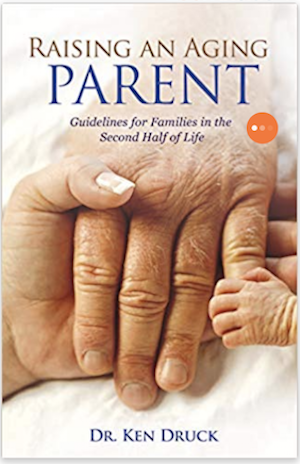The following is a guest post by Dr. Ken Druck, an international authority on Courageous Living and author of the new book “Raising an Aging Parent: Guidelines for Families in the Second Half of Life.” If you’d like to contribute a guest post to Money Q&A, be sure to check out the site’s guest posting guidelines.

In my work with families over the past 40 years, I’ve learned that conversations about sensitive subjects like money can be extremely difficult. Talking about money can be a source of great satisfaction and benefit or a source of terrible pain and conflict.

The success of a conversation about money depends largely on whether family members approach one another with “bad faith” (i.e. distrust, suspicion, and animosity) or “good faith” (i.e. trust, enthusiasm, and clarity). Operating in good faith and making sound financial decisions becomes even more critically important as our parents get older and their financial needs change.
Here are a few time-tested guidelines for how to effectively talk about money matters, whether you’re an aging parent or adult child. Following the best ensures that you will be helping create a collaborative spirit in your family, producing good results, and helping you and your parents family stay above water financially:
#1 Be thoughtful and respectful.
Setting the right tone for talking about money matters is always a good first step. Thoughtfully, respectfully, and encouragingly helping an aging parent manage their financial affairs can be as loving a gesture as anything else.
Whether we’re rich, poor, or somewhere in between, sensitively and respectfully discussing and managing money — budgeting for health care, housing, and other expenses, transferring wealth and property to children and grandchildren, or becoming a trusted advisor and advocate — can result in the kind of support and appreciation that helps our parents and brings our families closer.
#2 Get out in front of things.
Given the fact that our parents are living longer and the cost of living is rising, we need to do everything possible to stay ahead of the pain curve by talking to our parents, taking an honest inventory of our finances, and working together to plan best- and worst-case scenarios for the future.
Knowing the world is changing and many older citizens are outliving their financial resources, financial planners, estate planning attorneys, insurance brokers, and real estate agents are in fierce competition to solicit business from elderly clients who are downsizing, needing greater medical attention, dealing with cognitive decline, and growing increasingly incapable of managing many of their own affairs. Offering free steak and lobster dinners in upscale restaurants may be appealing, yet it often falls upon trusted family members and confidants to guide, advise, and tend to the financial affairs of our aging parents.
Families facing dire financial crises — such as having to spend $10,000 a month for a memory care facility for a mother or father who had been diagnosed with Alzheimer’s, or $5,000 a month for life-sustaining medications — are not uncommon. These kinds of unwelcome expenses can quickly exhaust a family’s resources, leaving them at the mercy of whatever health care insurance coverage, government agencies, and community resources they can turn to for help.
#3 Know your budget and income sources.
Sit down and take an honest inventory of your and/or your parents’ finances, perhaps with a financially literate family member or advisor. Where will the financial support for your health, housing, or living expenses come from as you get older? Do not allow your ego, false pride, fears, or denial get in the way of this analysis. If you begin to come up short, don’t be embarrassed to begin exploring alternative sources of income to cover your expenses.
As an example, our communities feed millions of aging Americans every day — good people who can’t afford breakfast or lunch, yet they get those meals in community centers throughout our nation. So whether it’s food, caregiving, medical care, or housing, do your homework and find out if there are other sources of support that you could be tapping into.
In communities like San Diego, where I live, there are incentives available for families who have room to build low-cost “granny flats” on their property equipped with all the things an older person would want. Although there are many wonderful Retirement Communities and Elder Care Facilities in our communities, there are less costly alternatives.
#4 Live within your means and avoid debt.
This is one of the conversations in which it might be best for you and your family to work with a trusted professional financial advisor like my friend Suze Orman, who has been a treasured resource to millions of people in this country, helping them plan out and plot out their financial future. Do your best and get professional help and guidance when you need it.
#5 Talk with everyone who is involved in your parent’s affairs.
It’s not uncommon for one or several siblings to take greater responsibility for a parent’s financial well-being, and this is admirable. To keep the peace, however, and make sure everyone is operating from the same playbook, it is strongly advised that they communicate with the rest of the family. Keeping the family’s CPA or financial advisor, attorney, and anybody else who needs to be in the conversation will also help prevent unnecessary drama.
#6 Beware of scams, cons, frauds, and thieves.
Sadly, there are criminals, vultures, and unethical professionals in our communities who prey upon older adults for financial gain. Our aging parents are being coached to be aware of strangers who take a sudden interest in their finances and to see this as a warning sign they may be getting groomed and played for something that is not in their or their family’s best interest.
Make sure you are dealing with reputable professionals and, if you’re not sure, ask the local authorities at the Better Business Bureau or DA’s office. Grandparents can also ask their grandkids to help them check someone’s credentials by Googling and Yelping them and their organizations.
#7 Get help when needed from trusted, financially literate friends, family, or professionals.
In my book “Raising an Aging Parent,” I discuss why it is important for families to be on the same page during the second half of life. Sometimes the best way to put our houses in order and create our best possible futures as a family is to seek help from a trusted financial planner or attorney whose only agenda is your well-being. Their experience and advice might level the playing field and open our family members to new and greater possibilities we would not have otherwise considered.
# 8 Learn About The Financial World
It’s not just about knowing what is going on with your own personal finances. If you try to give yourself a better understanding of the financial world around you, then you are going to be able to manage your own finances better. For example, there are many people in the world right now who are unbanked, or underbanked, and if you know what these terms mean, you can make sure neither of these things happens to you. Essentially, this means that they are credit invisible, which is not something that you want.
We understand that learning about finances might not be the most exciting topic for most people, but it’s essential. You can speak to a professional or do some research online, as long as you are making the effort.
Yours and your family’s financial health and well-being are closely linked to your quality of life, as well as the closeness, trust, and loving “pay it forward” legacy that we leave. By following these and other solid guidelines, money can truly be an asset, rather than a curse, preoccupation, threat, or source of conflict.
About the Author
Dr. Ken Druck is an international authority on Courageous Living and author of the new book “Raising an Aging Parent: Guidelines for Families in the Second Half of Life.” He has spent four decades helping individuals, families, companies, and communities grow into the more compassionate and resilient version of themselves by transforming adversities and challenges of every kind into opportunities. Learn more at www.kendruck.com.
